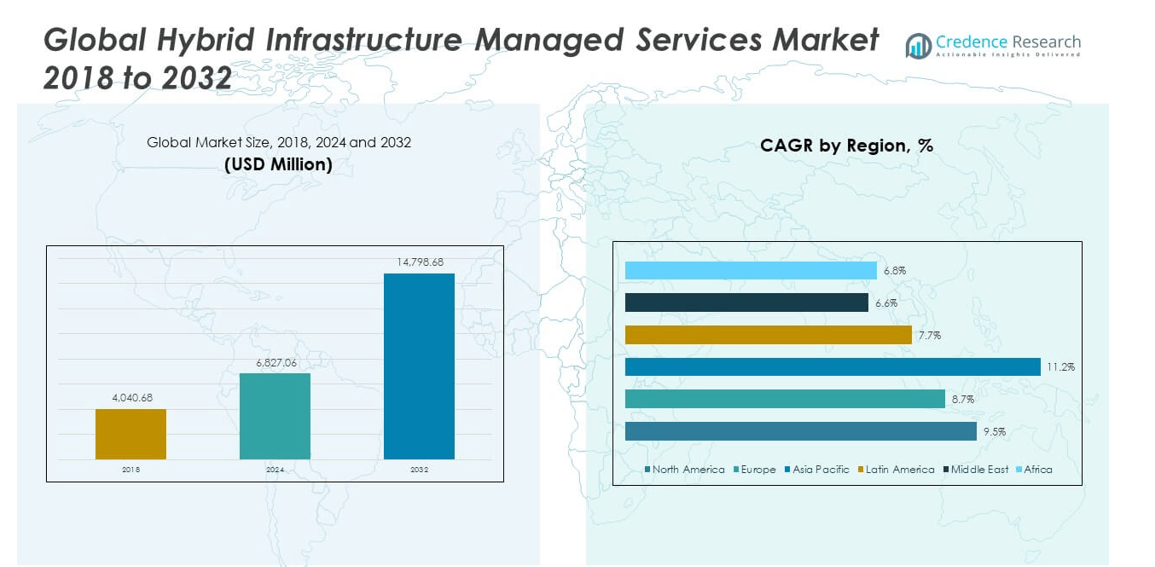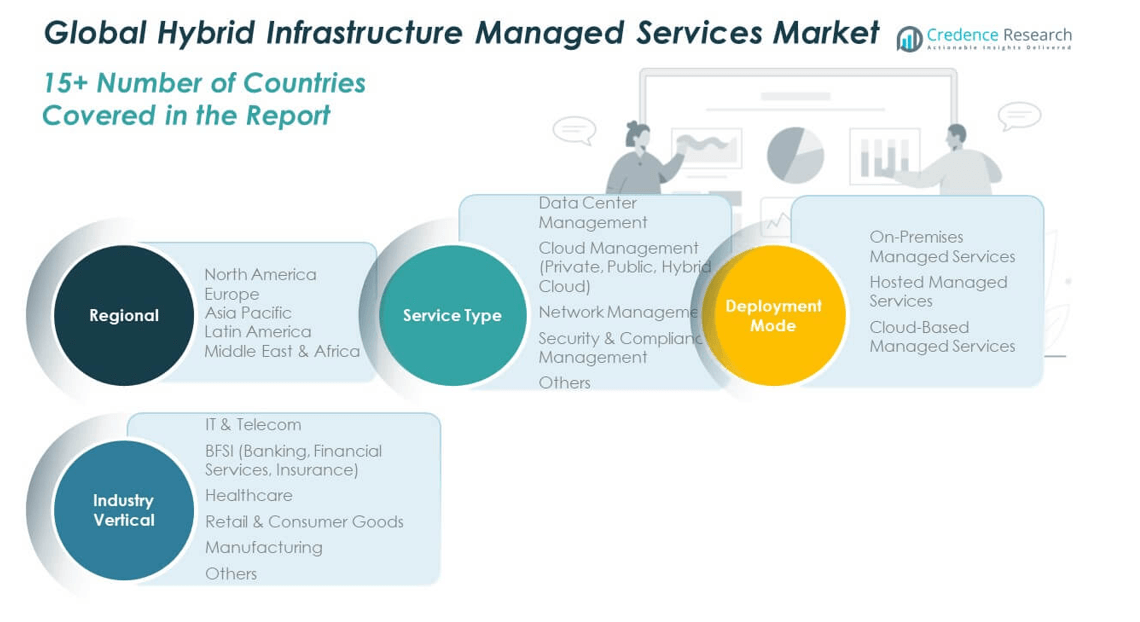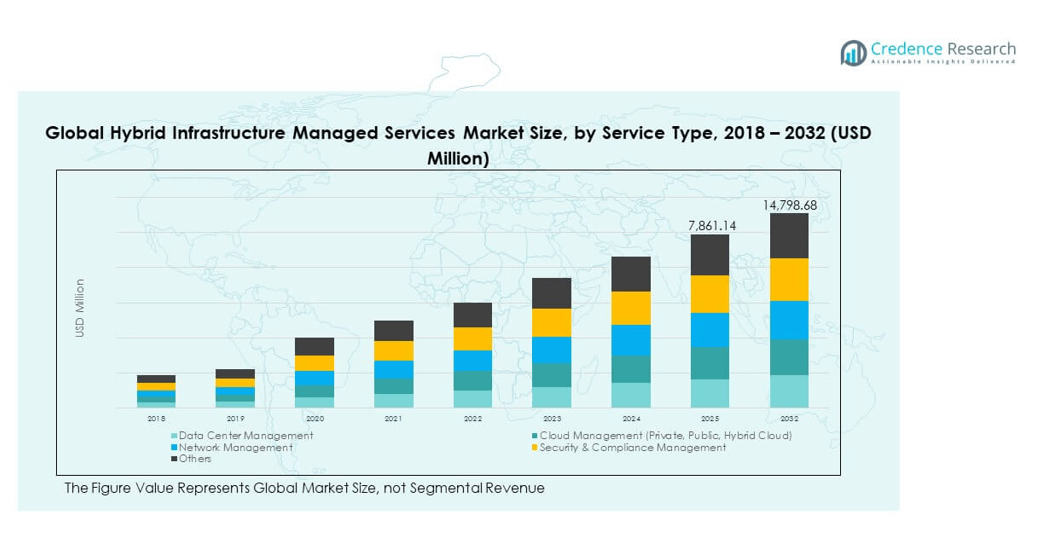CHAPTER NO. 1: GENESIS OF THE MARKET
1.1 Market Prelude – Introduction & Scope
1.2 The Big Picture – Objectives & Vision
1.3 Strategic Edge – Unique Value Proposition
1.4 Stakeholder Compass – Key Beneficiaries
CHAPTER NO. 2: EXECUTIVE LENS
2.1 Pulse of the Industry – Market Snapshot
2.2 Growth Arc – Revenue Projections (USD Million)
2.3. Premium Insights – Based on Primary Interviews
CHAPTER NO. 3: HYBRID INFRASTRUCTURE MANAGED SERVICES MARKET FORCES & INDUSTRY PULSE
3.1 Foundations of Change – Market Overview
3.2 Catalysts of Expansion – Key Market Drivers
3.2.1 Momentum Boosters – Growth Triggers
3.2.2 Innovation Fuel – Disruptive Technologies
3.3 Headwinds & Crosswinds – Market Restraints
3.3.1 Regulatory Tides – Compliance Challenges
3.3.2 Economic Frictions – Inflationary Pressures
3.4 Untapped Horizons – Growth Potential & Opportunities
3.5 Strategic Navigation – Industry Frameworks
3.5.1 Market Equilibrium – Porter’s Five Forces
3.5.2 Ecosystem Dynamics – Value Chain Analysis
3.5.3 Macro Forces – PESTEL Breakdown
3.6 Price Trend Analysis
3.6.1 Regional Price Trend
3.6.2 Price Trend by Service
CHAPTER NO. 4: KEY INVESTMENT EPICENTER
4.1 Regional Goldmines – High-Growth Geographies
4.2 Service Frontiers – Lucrative Service Categories
4.3 Application Sweet Spots – Emerging Demand Segments
CHAPTER NO. 5: REVENUE TRAJECTORY & WEALTH MAPPING
5.1 Momentum Metrics – Forecast & Growth Curves
5.2 Regional Revenue Footprint – Market Share Insights
5.3 Segmental Wealth Flow – Service Type & Industry Vertical Revenue
CHAPTER NO. 6: TRADE & COMMERCE ANALYSIS
6.1. Import Analysis by Region
6.1.1. Global Hybrid Infrastructure Managed Services Import Revenue By Region
6.2. Export Analysis by Region
6.2.1. Global Hybrid Infrastructure Managed Services Export Revenue By Region
CHAPTER NO. 7: COMPETITION ANALYSIS
7.1. Company Market Share Analysis
7.1.1. Global Hybrid Infrastructure Managed Services: Company Market Share
7.2. Global Hybrid Infrastructure Managed Services Company Revenue Market Share
7.3. Strategic Developments
7.3.1. Acquisitions & Mergers
7.3.2. New Service Launch
7.3.3. Regional Expansion
7.4. Competitive Dashboard
7.5. Company Assessment Metrics, 2024
CHAPTER NO. 8: HYBRID INFRASTRUCTURE MANAGED SERVICES MARKET – BY SERVICE TYPE SEGMENT ANALYSIS
8.1. Hybrid Infrastructure Managed Services Overview by Service Type Segment
8.1.1. Hybrid Infrastructure Managed Services Revenue Share By Service Type
8.2. Data Center Management
8.3. Cloud Management (Private, Public, Hybrid Cloud)
8.4. Network Management
8.5. Security & Compliance Management
8.6. Others
CHAPTER NO. 9: HYBRID INFRASTRUCTURE MANAGED SERVICES MARKET – BY DEPLOYMENT MODE SEGMENT ANALYSIS
9.1. Hybrid Infrastructure Managed Services Overview by Deployment Mode Segment
9.1.1. Hybrid Infrastructure Managed Services Revenue Share By Deployment Mode
9.2. On-Premises Managed Services
9.3. Hosted Managed Services
9.4. Cloud-Based Managed Services
CHAPTER NO. 10: HYBRID INFRASTRUCTURE MANAGED SERVICES MARKET – BY INDUSTRY VERTICAL SEGMENT ANALYSIS
10.1. Hybrid Infrastructure Managed Services Overview by Industry Vertical Segment
10.1.1. Hybrid Infrastructure Managed Services Revenue Share By Industry Vertical
10.2. IT & Telecom
10.3. BFSI (Banking, Financial Services, Insurance)
10.4. Healthcare
10.5. Retail & Consumer Goods
10.6. Manufacturing
10.7. Others
CHAPTER NO. 11: HYBRID INFRASTRUCTURE MANAGED SERVICES MARKET – REGIONAL ANALYSIS
11.1. Hybrid Infrastructure Managed Services Overview by Region Segment
11.1.1. Global Hybrid Infrastructure Managed Services Revenue Share By Region
11.1.2. Region
11.1.3. Global Hybrid Infrastructure Managed Services Revenue By Region
11.1.4. Service Type
11.1.5.Global Hybrid Infrastructure Managed Services Revenue By Service Type
11.1.6. Deployment Mode
11.1.7. Global Hybrid Infrastructure Managed Services Revenue By Deployment Mode
11.1.8. Industry Vertical
11.1.9. Global Hybrid Infrastructure Managed Services Revenue By Industry Vertical
CHAPTER NO. 12: NORTH AMERICA HYBRID INFRASTRUCTURE MANAGED SERVICES MARKET – COUNTRY ANALYSIS
12.1. North America Hybrid Infrastructure Managed Services Overview by Country Segment
12.1.1. North America Hybrid Infrastructure Managed Services Revenue Share By Region
12.2. North America
12.2.1. North America Hybrid Infrastructure Managed Services Revenue By Country
12.2.2. Service Type
12.2.3. North America Hybrid Infrastructure Managed Services Revenue By Service Type
12.2.4. Deployment Mode
12.2.5. North America Hybrid Infrastructure Managed Services Revenue By Deployment Mode
12.2.6. Industry Vertical
12.2.7. North America Hybrid Infrastructure Managed Services Revenue By Industry Vertical
2.3. U.S.
12.4. Canada
12.5. Mexico
CHAPTER NO. 13: EUROPE HYBRID INFRASTRUCTURE MANAGED SERVICES MARKET – COUNTRY ANALYSIS
13.1. Europe Hybrid Infrastructure Managed Services Overview by Country Segment
13.1.1. Europe Hybrid Infrastructure Managed Services Revenue Share By Region
13.2. Europe
13.2.1. Europe Hybrid Infrastructure Managed Services Revenue By Country
13.2.2. Service Type
13.2.3. Europe Hybrid Infrastructure Managed Services Revenue By Service Type
13.2.4. Deployment Mode
13.2.5. Europe Hybrid Infrastructure Managed Services Revenue By Deployment Mode
13.2.6. Industry Vertical
13.2.7. Europe Hybrid Infrastructure Managed Services Revenue By Industry Vertical
13.3. UK
13.4. France
13.5. Germany
13.6. Italy
13.7. Spain
13.8. Russia
13.9. Rest of Europe
CHAPTER NO. 14: ASIA PACIFIC HYBRID INFRASTRUCTURE MANAGED SERVICES MARKET – COUNTRY ANALYSIS
14.1. Asia Pacific Hybrid Infrastructure Managed Services Overview by Country Segment
14.1.1. Asia Pacific Hybrid Infrastructure Managed Services Revenue Share By Region
14.2. Asia Pacific
14.2.1. Asia Pacific Hybrid Infrastructure Managed Services Revenue By Country
14.2.2. Service Type
14.2.3. Asia Pacific Hybrid Infrastructure Managed Services Revenue By Service Type
14.2.4. Deployment Mode
14.2.5. Asia Pacific Hybrid Infrastructure Managed Services Revenue By Deployment Mode
14.2.5. Industry Vertical
14.2.7. Asia Pacific Hybrid Infrastructure Managed Services Revenue By Industry Vertical
14.3. China
14.4. Japan
14.5. South Korea
14.6. India
14.7. Australia
14.8. Southeast Asia
14.9. Rest of Asia Pacific
CHAPTER NO. 15: LATIN AMERICA HYBRID INFRASTRUCTURE MANAGED SERVICES MARKET – COUNTRY ANALYSIS
15.1. Latin America Hybrid Infrastructure Managed Services Overview by Country Segment
15.1.1. Latin America Hybrid Infrastructure Managed Services Revenue Share By Region
15.2. Latin America
15.2.1. Latin America Hybrid Infrastructure Managed Services Revenue By Country
15.2.2. Service Type
15.2.3. Latin America Hybrid Infrastructure Managed Services Revenue By Service Type
15.2.4. Deployment Mode
15.2.5. Latin America Hybrid Infrastructure Managed Services Revenue By Deployment Mode
15.2.6. Industry Vertical
15.2.7. Latin America Hybrid Infrastructure Managed Services Revenue By Industry Vertical
15.3. Brazil
15.4. Argentina
15.5. Rest of Latin America
CHAPTER NO. 16: MIDDLE EAST HYBRID INFRASTRUCTURE MANAGED SERVICES MARKET – COUNTRY ANALYSIS
16.1. Middle East Hybrid Infrastructure Managed Services Overview by Country Segment
16.1.1. Middle East Hybrid Infrastructure Managed Services Revenue Share By Region
16.2. Middle East
16.2.1. Middle East Hybrid Infrastructure Managed Services Revenue By Country
16.2.2. Service Type
16.2.3. Middle East Hybrid Infrastructure Managed Services Revenue By Service Type
16.2.4. Deployment Mode
16.2.5. Middle East Hybrid Infrastructure Managed Services Revenue By Deployment Mode
16.2.6. Industry Vertical
16.2.7. Middle East Hybrid Infrastructure Managed Services Revenue By Industry Vertical
16.3. GCC Countries
16.4. Israel
16.5. Turkey
16.6. Rest of Middle East
CHAPTER NO. 17: AFRICA HYBRID INFRASTRUCTURE MANAGED SERVICES MARKET – COUNTRY ANALYSIS
17.1. Africa Hybrid Infrastructure Managed Services Overview by Country Segment
17.1.1. Africa Hybrid Infrastructure Managed Services Revenue Share By Region
17.2. Africa
17.2.1. Africa Hybrid Infrastructure Managed Services Revenue By Country
17.2.2. Service Type
17.2.3.Africa Hybrid Infrastructure Managed Services Revenue By Service Type
17.2.4. Deployment Mode
17.2.5. Africa Hybrid Infrastructure Managed Services Revenue By Deployment Mode
17.2.6. Industry Vertical
17.2.7. Africa Hybrid Infrastructure Managed Services Revenue By Industry Vertical
17.3. South Africa
17.4. Egypt
17.5. Rest of Africa
CHAPTER NO. 18: COMPANY PROFILES
18.1. IBM Corporation
18.1.1. Company Overview
18.1.2. Service Portfolio
18.1.3. Financial Overview
18.1.4.Recent Developments
18.1.5. Growth Strategy
18.1.6. SWOT Analysis
18.2. Accenture
18.3. Cisco Systems, Inc.
18.4. DXC Technology
18.5. Atos SE
18.6. Fujitsu Limited
18.7. Cognizant Technology Solutions
18.8. HCL Technologies
18.9. Wipro Limited
18.10. Capgemini SE






